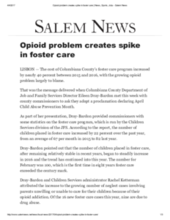Displaying 1711 - 1720 of 2221
This article explores sexuality education and sexual healthcare for female adolescents in foster care with ID/DD and recommends practice guidelines to support and prepare their emergent sexual development.
Girl's death is a stark demonstration of Texas's foster care shortage.
Governor, First Lady talk about raising nine kids, and overhauling state foster care system
Parents' drug abuse often lead children down a path of abuse, neglect, and abandonment.
A camp designed to help youths who have been through the foster care system cope with grief and connect with others who have lost their birth families.
Two years into new plan to address neglect and abuse, workers still find significant care issues in DHS group homes.
Restore Opportunity Now coalition seeks living wage for human service workers.
Opioid problem has caused the cost of foster care in Columbiana County, Massachusetts to increase 40 percent.
Child abuse causes the number of children in foster care to rise.
In order to better serve youth trafficking victims, this study developed a Human Trafficking Screening Tool (HTST) and pretested it with 617 runaway and homeless youth and child welfare-involved youth.


